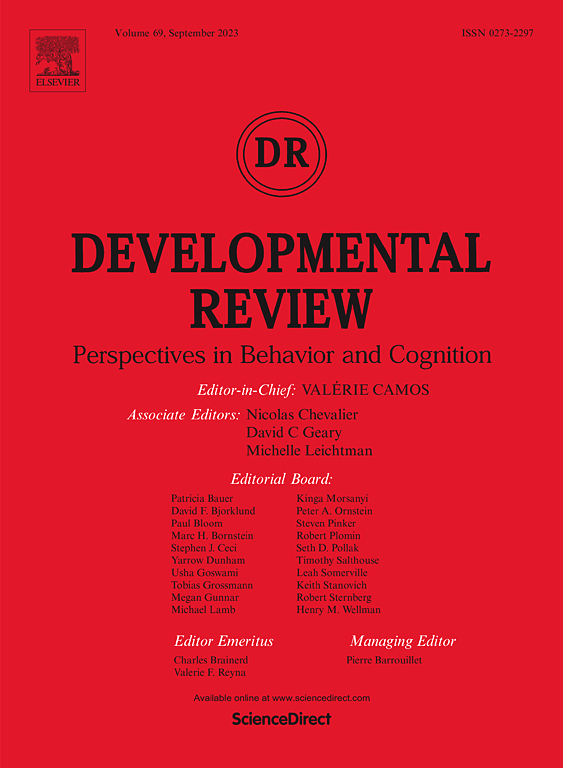以人为本研究认知控制与语言发展相互作用的影响
IF 5.6
1区 心理学
Q1 PSYCHOLOGY, DEVELOPMENTAL
引用次数: 0
摘要
本文从以人为本的角度,从语言能力的连续性出发,探讨了学龄前和学龄儿童的认知控制与语言之间的相互作用。工作记忆、抑制控制和注意力是认知控制功能,它们与语言能力不同的儿童的语言技能高度相关,包括那些正常发育的儿童,以及那些有语言障碍和语言天赋或天赋的儿童。例如,患有发展性语言障碍(DLD)的儿童,在跨模式和领域的一系列任务中表现出较差的工作记忆和对干扰物和主动干扰的抵抗力较弱。在语言能力连续体的另一端,具有语言天赋的儿童在语言、工作记忆和干扰任务方面表现优异。对具有不同语言技能的儿童的工作记忆、抑制控制和注意力之间的相互联系的分析,使我们能够强调特定功能是如何受损的,而在每个人群的发展过程中,其他功能是如何幸免的。这项研究还证明了认知控制功能的关联和分离是如何与任务设计和条件以及儿童能力的个体差异相关的。本文的目的是提出一种以人为本的方法,描述在全球和局部因素以及个人技能的背景下认知控制与语言发展之间的关系。这一综合框架综合了认知控制和语言的特定组成部分和过程,可以指导每个学科相互交流。本文章由计算机程序翻译,如有差异,请以英文原文为准。
A person-centered approach to examining effects on the interaction between cognitive control & language development
This paper examines the interaction between cognitive control and language in preschool- and school-age children across a continuum of language ability from a person-centered perspective. Working memory, inhibitory control, and attention are cognitive control functions that are highly correlated with language skills in children of varying language ability, including those who are typically developing, as well as in those who have language disorders and language talent, or giftedness. Children with developmental language disorder (DLD), for example, demonstrate poor working memory and weak resistance to distractor and proactive interference on a range of tasks across modalities and domains. At the other end of the language ability continuum, children with language talent exhibit superior performance in language, working memory, and interference tasks. Analysis of the interconnections across working memory, inhibitory control, and attention in children with different language skills allows us to highlight how specific functions are impaired, whereas others are spared during development within each population. This research also demonstrates how associations and dissociations in cognitive control functions are related to both task design and conditions, alongside individual differences in children’s abilities.
The objective of this paper is to present a person-centered approach that describes the relationship between cognitive control and language development in the context of global and local factors, as well as individual skills. This integrative framework synthesizes selected components and processes of cognitive control and language and may guide each discipline in informing the other.
求助全文
通过发布文献求助,成功后即可免费获取论文全文。
去求助
来源期刊

Developmental Review
PSYCHOLOGY, DEVELOPMENTAL-
CiteScore
11.00
自引率
3.00%
发文量
27
审稿时长
51 days
期刊介绍:
Presenting research that bears on important conceptual issues in developmental psychology, Developmental Review: Perspectives in Behavior and Cognition provides child and developmental, child clinical, and educational psychologists with authoritative articles that reflect current thinking and cover significant scientific developments. The journal emphasizes human developmental processes and gives particular attention to issues relevant to child developmental psychology. The research concerns issues with important implications for the fields of pediatrics, psychiatry, and education, and increases the understanding of socialization processes.
 求助内容:
求助内容: 应助结果提醒方式:
应助结果提醒方式:


